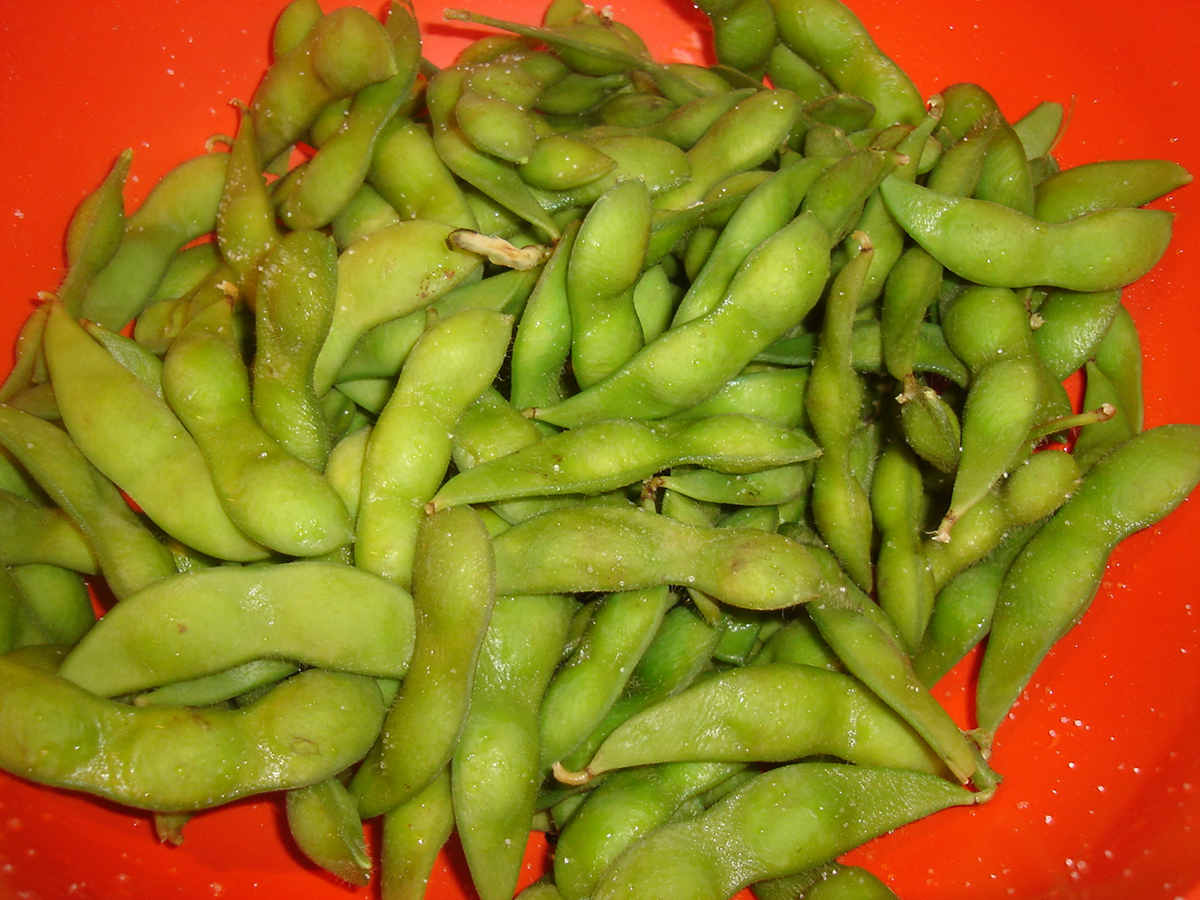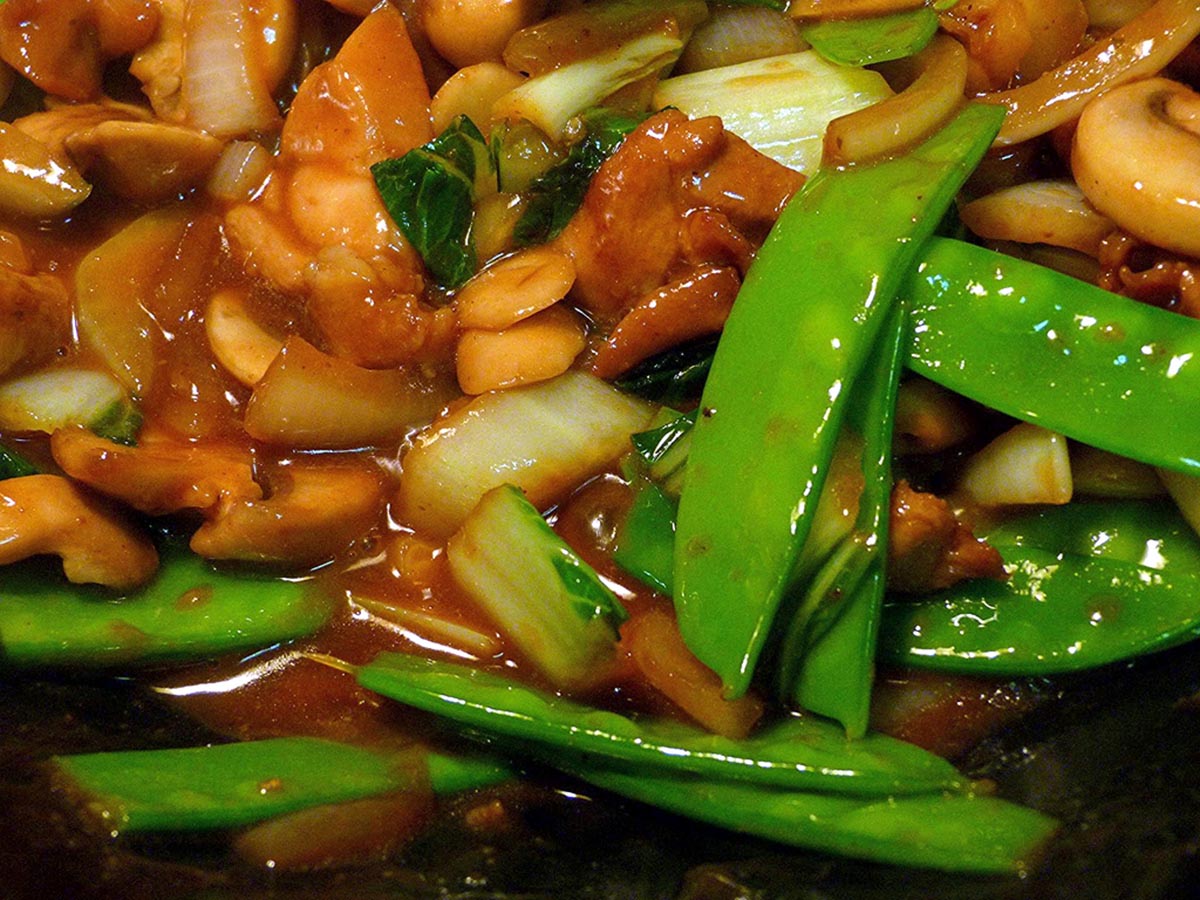Soybeans originally come from South-East Asia, where the Chinese cultivated them as far back as 1100 BC. China is also where a British colonist Procured soybean seeds, trying them out in what was then the British colony of Georgia in 1765. Reportedly, even Benjamin Franklin tried them out!
I knew none of this when I first tried soybeans, both roasted and in the form of tofu — rather, being a vegetarian, I picked these things up in a health food store in Holland, where I live, probably 20 or so years ago. I'm a vegetarian, and tofu was recommended as a great source of protein as well as a "meat replacer", along with seitan.

Growing up in a boring meat-and-potato family, as a new vegetarian I learned a lot from my weird aunt, who had spontaneously decided to quit meat when she was in her teens, something that was highly unusual back then. It took me a few years until I realized that tofu could be dressed up to taste awesome, rather than being a bland slab or white nutrition that I merely tolerated because everyone said I needed the protein. Tempeh and Miso were later added to my list of soy products as well.
Things have changed in the meantime. Hipsters now order soy milk-based smoothies from juice bars, tofu is ever-present in Chinese fast food restaurants, vegetarian sausages made of soybeans have become a staple in my diet, and I recently tried out edamame — young soybeans still in their pods — steamed with coarse sea salt in a sushi restaurant. Soy, it's clear, is everywhere these days.
Why Do People Incorporate Soy In Their Diets?
The nutritional value of soy varies depending on the form in which you are consuming it. Regardless, all soy-based products contain:
- Protein
- Dietary fiber (yes, even the milk in small amounts)
- Polyunsaturated fats and monounsaturated fats
- Potassium
- Calcium
- Iron
- Magnesium
READ Is Soy Milk Better Than Cow's Milk?
I've always known soy as a food that's ideal for vegetarians and vegans, due to its protein, iron and calcium. Its fiber makes it ideal for people suffering from constipation as well, and it's great for people with type 2 diabetes and high cholesterol levels as well.
The Verdict: Does Soy Benefit Your Health Or Endanger It?
Phytoestrogens: Good Or Bad?
Besides all the goodies already mentioned, soy also contains something else: phytoestrogens. Phytoestrogens are plant-derived zenoestrogens found in a huge number of different foods, including but not limited to flax, oats, barley, lentils, rice, alfafa, pomegranates, mint, and ginger. There are different kinds of phytoestrogens, and the ones found in soy are called isoflavones. Phytoestrogens are very similar in structure to the female hormone estrogen, and affect the body in a similar way.
That may be a good thing — there is research that suggests that consuming soybeans can lower a woman's risk of developing breast cancer. On top of that, phytoestrogens, meaning plant-derived estrogens, have also been found to cancel out the effect of excess estrogen production. That means a diet rich in soy products can benefit many women who are suffering from conditions related to excess estrogen, namely PMS and endometriosis, find symptom relief.

Estrogen production stops as women enter the menopause, causing a wide range of symptoms that are really uncomfortable for some ladies, like hot flashes, moodiness, vaginal dryness, and sweats and chills. Because soy contains a form of estrogen, some use it as an alternative to Hormone Replacement Therapy rather successfully.
So there's that, there's the good things. What does consuming lots and lots of soy do to men, however?
Anecdotal evidence from many men and their doctors shows that cases of gynecomastia (also known as "man boobs") have been linked to a diet very rich in soy. What's more, studies have shown very worrying potential side effects of eating too much soy: a decreased sperm count in men, and erectile problems in rats.
Finally, while earlier studies suggested that consuming soy products regularly could have a positive effect on heart health, an Indonesia-based study showed an increased risk of memory loss and dementia in both men and women who ate lots of tofu.
GMO Soybeans?
Think "soy", and perhaps "genetically modified" will soon follow in your mind. In 2007, 58.6 percent of all soybeans produced globally were genetically modified, including 85 percent of soybeans produced in the United States. Soy is the crop most likely to be genetically modified. Is that dangerous? Countless natural health websites will certainly tell you so.
It's up to you whether you want to try to avoid genetically modified soy. If you do want to do this, health food shops are your best bet. Meanwhile, realize that, if you eat any processed food, you will definitely be ingesting GMO foods elsewhere. A whopping 80 percent of all our foods are genetically modified these days, after all. It is awfully hard to avoid that stuff.
READ Soy Protein Vs. Whey Protein - Who Wins?
In Conclusion...
Is soy good for you or bad for you? As a vegetarian woman who eats soy products in moderation, perhaps three times a week, my own conclusion is that the benefits outweigh the risks. Your own risk assessment may yield different results, especially if you are a man who currently eats lots of soy. Mostly though, it's safe to say that eating soy in moderation is just fine, and more than that, good for you.
- Photo courtesy of mdid: www.flickr.com/photos/mdid/829877544/
- Photo courtesy of rusty_clark: www.flickr.com/photos/rusty_clark/8320024006/
- www.ncbi.nlm.nih.gov/pubmed/18583909
- humrep.oxfordjournals.org/content/23/11/2584.full
- www.menshealth.com/nutrition/soys-negative-effects
- www.bbcgoodfood.com/howto/guide/ingredient-focus-soya
- www.cancerresearchuk.org/about-cancer/type/breast-cancer/about/diet-and-breast-cancer#soya
- www.webmd.com/food-recipes/truth-about-gmos?page=2
- www.gmo-compass.org/eng/grocery_shopping/crops/19.genetically_modified_soybean.html


Your thoughts on this